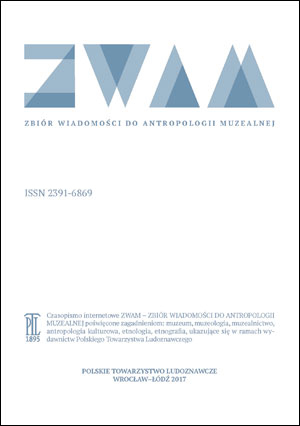„Na szlaku. Muzea a turystyka”.
On The Route. Museums and Tourism
The Second Spring Museum Seminar Pieniężno 2015
Author(s): Anna Nadolska-StyczyńskaSubject(s): Anthropology, Sociology
Published by: Polskie Towarzystwo Ludoznawcze
Summary/Abstract: Between 18–19th June 2015 in Pieniężno, at the SVD Mission Seminary, the second in the series of annual museum meetings took place. These events are dedicated to discuss the museums’ mission, tasks and activities. The organisers were Nicolaus Copernicus Univer-sity in Toruń and the SVD Mission Seminary. The topic of the 2015 meeting was the relationship between museums and tourism. Museums do not exist in a vacuum. They are set in a particular place and time, and their programs are usually addressed to groups of visitors known to the museums from their past experience (and only rarely, this is an outcome of a dedicated research). The visitors represent diverse standards of knowledge, needs and behavioural habits. However, it is important to decide how different are museums that dedicate their programs to the local audience, compared to museums that cater mainly for non residents, i.e. tourists.Eleven researchers who participated in this meeting represented a range of academic fields as well as came from diverse museums. In addition, there were non engaged persons who knew museums and tourism only from their own personal experience.During the meeting two major themes were discussed: ‘museums versus tourism’ and ‘tourism versus museums’. Following the expectations of the organisers, the meeting resulted in an exchange of views that, at times, were radically opposed to each other. The tourism industry is frequently not aware of the rules and limitations resulting from the nature of museum work. On the other hand, for a museum worker, frequently, the major aim of his or her institution is not the promotion of culture, but the protection of the artefacts deposited there. In its work, first of all, each museum has to comply with the guidelines of the Museum Statute as well as the ICOM Code of Ethics. The conflicting opinions resulted, at times, in heated discussion. At the same time if proved that it was worth considering the views of the opposing side and the need for a greater flexibility in creating expectations as well as confronting the museums with accusations. The seminar provided evidence how museums are perceived by the tourism industry. Unfortunately, usually this is a onesided view, not always justified or supported by evidence. On the other hand, this criticism could be used as an important point of departure in examining museums’ shortcomings. Museum workers tried to convince the other party how important it is to shift the client based perception and to understand a museum as an institution destined to protect, educate and research heritage objects.The participants of this seminar decided to present their views in articles that were to be published in the 3rd issue of ZWAM. Some did fulfil this promise, and therefore in this year’s journal you may learn in greater detail the outcomes of this seminar. Enjoy the reading!
Journal: Zbiór Wiadomości do Antropologii Muzealnej
- Issue Year: 3/2016
- Issue No: 1
- Page Range: 73-78
- Page Count: 6
- Language: Polish

